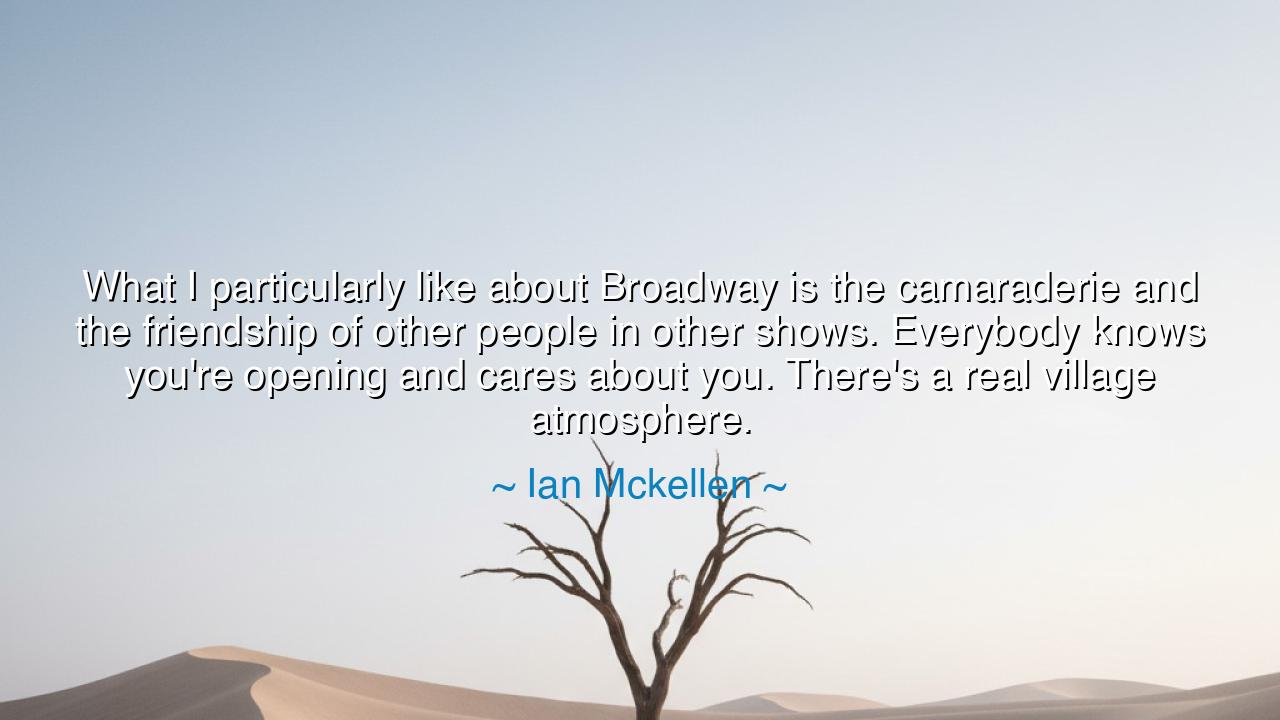
What I particularly like about Broadway is the camaraderie and
What I particularly like about Broadway is the camaraderie and the friendship of other people in other shows. Everybody knows you're opening and cares about you. There's a real village atmosphere.






“What I particularly like about Broadway is the camaraderie and the friendship of other people in other shows. Everybody knows you're opening and cares about you. There's a real village atmosphere.” — with these words, Ian McKellen, the venerable actor whose voice has thundered across both stage and screen, unveils the heart of the theater not as a place of rivalry, but of brotherhood. Beneath the glitter and the spotlight, he sees not competition but community. For Broadway, to him, is not merely a street lined with theaters; it is a living village where hearts beat in unison for art, where every curtain rise is a shared triumph, and every failure is met with collective compassion.
At its core, this quote speaks of the sacred bond forged by those who labor in the same craft — a camaraderie born of shared struggle, shared fear, and shared glory. The stage is merciless, demanding every ounce of courage and vulnerability. And yet, those who walk its boards do not stand alone. McKellen reminds us that true artists are not adversaries, but companions walking parallel roads toward truth and beauty. Friendship among artists becomes a form of moral sustenance, the unseen scaffolding that holds up the spirit when applause fades and self-doubt whispers.
This spirit of Broadway mirrors the ancient guilds of craftsmen, where masters and apprentices worked side by side, united by devotion to their art. In the medieval cathedrals of Europe, stonemasons carved their souls into stone, yet each supported the other, for they knew that no single hand could raise a spire alone. Similarly, in Broadway’s “village,” every show, every actor, every technician becomes a builder of a grand temple of collective creativity. McKellen’s words remind us that art flourishes not in isolation but in fellowship — that greatness is never born from ego, but from shared passion.
We find echoes of this truth in history’s grand stages. When Shakespeare’s troupe, The Lord Chamberlain’s Men, performed at the Globe Theatre, they too lived this spirit. Actors helped one another learn lines, fix costumes, and weather storms both literal and emotional. When a play opened, the entire company rejoiced, not just those in the spotlight. The success of one was the success of all. Shakespeare’s words might have been immortal, but it was the fellowship of players that gave those words life. Like McKellen centuries later, they understood that the theater is not built of wood and paint, but of trust, laughter, and shared humanity.
McKellen’s “village atmosphere” is not unique to Broadway — it is the eternal ideal of any community that values creation over competition. Whether it is a group of scientists in a lab, soldiers on the battlefield, or friends building a dream together, the same sacred bond exists. To care for another’s success, to celebrate another’s courage, to feel pride not in one’s own spotlight but in another’s — this is the mark of a soul that understands the deeper harmony of life. For in truth, no man rises alone, and no art breathes without the breath of others.
The lesson here is powerful: seek not to outshine others, but to shine with them. Rejoice when your companions succeed, for their victory adds light to your world as well. Support those who walk beside you, for their strength sustains yours. In the village of humanity, each of us is both actor and audience, teacher and student. The moment we understand this, the bitterness of envy dissolves, and in its place grows joy — a joy that multiplies rather than competes.
In practice, this means choosing community over ego. When a friend achieves a milestone, celebrate them sincerely. When a colleague struggles, lift them quietly. When you succeed, remember those who held the rope for you as you climbed. True greatness is never solitary; it is the reflection of many hearts moving together toward one purpose. Just as Broadway’s lights illuminate all who tread its stage, so too does compassion illuminate every soul that shares in another’s dream.
For in the end, Ian McKellen’s words remind us that the highest art is not the performance, but the fellowship that makes it possible. The applause fades, the curtain falls, but what endures is the spirit of unity — the laughter in dressing rooms, the shared prayers before the show, the knowledge that no one stands alone beneath the lights. This is the eternal truth of both theater and life: that while talent may make the show, it is friendship that makes the masterpiece.






AAdministratorAdministrator
Welcome, honored guests. Please leave a comment, we will respond soon